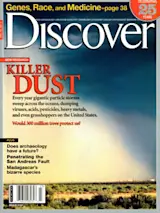As often happens, the meaning of this word changed as it migrated from one language to another. Originally it was a small 15th-century Flemish coin, a placke. Then the French borrowed it to describe thin, flat patches, badges, or slabs, and later on the English twisted the meaning to denote ornamental plates, tablets, and awards that can be hung on a wall—a term still in use today. In the late 19th century, biologists started using plaque to mean a thin patch of cells. It is now generic for a growth on the skin or a deposit on a mucous surface, such as the wall of an artery. However, it is most recognized in dentistry as the clear mass of microorganisms that colonize teeth and lead to cavities and gum disease. In recent years the word also became associated with Alzheimer’s, the degenerative brain disease. Those plaques are dense deposits of ...
Delineations: Plaque
Discover the evolving meaning of plaque, from a coin to dental plaque microorganisms and its link to Alzheimer’s brain disease.
More on Discover
Stay Curious
SubscribeTo The Magazine
Save up to 40% off the cover price when you subscribe to Discover magazine.
Subscribe













